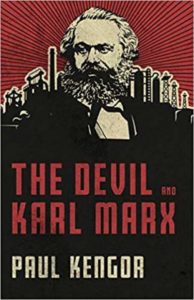Why Karl Marx Hated God, and Marxists Hate Christians
Part one of an interview with scholar Paul Kengor.

In a screenshot from a video by Ruptly in Portland on Aug. 1, what appears to be an open-face Bible is burned (top right inset image). A few minutes later, an American flag is burned on top of the Bible (not pictured). Minutes later (main image) a man with a black lives matter sign rips up a Bible and throws it on the fire.
A movement led by “trained Marxists,” Black Lives Matter, now dominates the headlines, and thugs fighting in its name control several U.S. cities. So we need to understand Marx. Was he an idealist? A lover of the poor? A brilliant economist? A ‘man for others’? Or something much, much darker … a Gnostic who just “wanted to watch the world burn”? If Marx was in the grips of dark spirits when he drew up his system, what does that say of his followers today? Of churchmen who blindly embrace and parrot the slogans of Marxist groups, like BLM?
To find out, The Stream interviewed conservative scholar Paul Kengor. We talked about his powerful new book, The Devil and Karl Marx.
John Zmirak: Your new book The Devil and Karl Marx is fascinating — and disturbing. One thing you turn up that no one ever talks about: Marx’s fascination with Satan. You quote early works of Marx’s where he obsessively referenced Faust, Mephistopheles, Prometheus. All were figures of rebellion against God. Can you expand on that for Stream readers, maybe offer a few choice quotes?
Paul Kengor: There are so many examples, John. And frankly, that’s the point. There’s too much to shrug off. I hesitate to try to give even one or two examples here, because they won’t be sufficient.
Marx’s poems and plays are rife with pacts with the devil, suicide pacts, violence, vengeance, fire, despair, destruction, and death. Marx waxed poetic about “Hellish vapors,” about the “Prince of Darkness” selling a “blood-dark sword [that] shall stab unerringly within thy soul,” of “Heaven I’ve forfeited, I know it full well, My soul, once true to God, Is Chosen for Hell.”
Among the most chilling of Marx’s writings was the play that he titled Oulanem. Two Marx biographers (Robert Payne and Richard Wurmbrand) say that title is a sacrilegious inversion of the holy name “Manuelo” or “Emmanuel.” As Payne formulated it “Manuelo = Immanuel = God.” Wurmbrand was even more blunt. He identified the anagram as a directly Satanist anagram for the Hebrew Biblical name for Jesus, meaning “God is with us.” Of course, in sacred Scripture, the Angel Gabriel says to the Virgin Mary that she shall bear a child, and his name shall be Emmanuel, or Jesus. He will be called “Son of the Most High.” But these were not the words (or purpose) of Karl Marx in his anagram for Emmanuel — and for his “Oulanem.”
Wurmbrand published that observation in the 1980s. Payne wrote about the play in his superb biographies of Marx in the 1960s and 1970s, published by the likes of Simon & Schuster and New York University Press. Payne was a respected and fair scholar, a British professor of literature and the arts, and no right-winger. If you Google the word “Oulanem” today, you will immediately find a Wikipedia reference to Marx’s play. A warning, however: your screen will also display repulsive images of Satanic figures. Don’t bother, dear reader. I’ve done the dirty work for you.
Marx’s message in Oulanem is dark and destructive, like his poems. Payne observed that the violence unleashed by Marx in some of his poems is turned inward, as the subject destroys himself. But the violence in Oulanem is turned outward with the destruction of all mankind by the character that is “Oulanem.” Still more disquieting was Marx’s personal role in that vision. Payne observes: “We enter a world where all the characters are learned in the arts of destruction, caught in the coils of a secret rage for vengeance.” He says that in this play, “Marx was giving vent to his own destructive rages. Oulanem is a revenger’s tragedy.”
Was Marx … Possessed?
Some of these biographers seem to me to suggest that Karl Marx was possessed, or a Satanist. What do you say about that?
I’d really like to clarify here, to this audience, a crucial distinction I try to make. I see that it’s getting lost in some of the reaction to the book. I do not say nor do I know whether Karl Marx was possessed or a Satanist. I do quote others who speculate on that possibility or claim it outright. Those are things I couldn’t begin to affirm. I say that very carefully right up front and repeatedly. I’ve never encountered examples of Marx dabbling in the occult or engaging in black Masses or pagan worship. (Though I give examples of other communists doing such things.)
As I say early on, this book could be better titled, The Devil and Communism, because it goes way beyond the person of Marx. Read the section on the communist prison camp at Pitesti. People will be utterly shocked at the vile expressions of evil and depravity that they can’t even imagine — black Masses, mock crucifixions, priests forced to form communion wafers out of human excrement, denunciations of Mary as “the great whore,” of Jesus as “the great idiot crucified on the cross.” Read the material on Walter Duranty and Aleister Crowley. Read the section on Kate Millett. Read the weird and sometimes occultish garbage from certain members of the Frankfurt School.
But as for Marx specifically, I say this in the preface: There was a deep hatred of religion and interest in the “dark side” that is undeniable and chilling, especially in Marx’s poetry. We repeatedly encounter in the life of Marx the words that family members and close friends used referring to him. Phrases like “governed by a demon” (his father), “my dear devil” (his son), “monster of ten thousand devils” (Engels). See the striking number of intimates and associates who compared him to Faust or Mephistopheles. They used words like “possessed,” or “eyes like a wet goblin,” or “take under a spell,” to describe his demeanor. One observed Marx shouting or “chanting the words from Faust.”
There are way too many of these to blithely ignore.
“There were times when Marx seemed to be possessed by demons,” recorded Robert Payne in his chapter “The Demons.” This appeared in his seminal 1968 biography of Marx. “He had the devil’s view of the world, and the devil’s malignity. Sometimes he seemed to know that he was accomplishing works of evil.”
There were times when Marx seemed to be possessed by demons. He had the devil’s view of the world, and the devil’s malignity. Sometimes he seemed to know that he was accomplishing works of evil.
What is undeniable is the evil associated with and wrought by Marxist-communist ideology: at least 100 million dead in the 20th century alone.
A word of caution here to all scholars and biographers, especially Christian ones. You don’t want to overstate things, but you also don’t want to understate. There’s room in the world for nuance and making careful distinctions, even if this lousy Twitter culture militates against it. Describing Marx’s views requires more than 40 characters on a Twitter feed, or whatever the limit is.
He Wanted to Watch the World Burn
What I took away from your book is that Marx’s first and most defining preoccupation was with cosmic revolt. He wanted to overthrow, destroy, rip up, dissolve, and shred what he saw around him. That didn’t just include the market economy. He wanted to smash up nations. It seems that later on he came up with his Communist Utopia, a fantasy land of perfect harmony and peace. But the urge to destroy came first, and was more fundamental. Would you say that’s fair?
You see that in Oulanem. Here, the principal character, who serves as a sort of mock Creator, rises and declares of the world: “I shall howl gigantic curses at mankind.” And “I will smash to pieces with my enduring curses.” Payne interpreted it this way: “Oulanem was Marx as judge and executioner.”
Richard Wurmbrand, the Romanian pastor who spent 14 years tortured for Christ in a communist prison camp, says: “There is no support for the view that Marx entertained lofty social ideals about helping mankind. Marx hated any notion of God or gods. He determined to be the man who would kick out God.”
Marx’s disciples and implementers would certainly try to kick out God.
Part II of this interview will run later this week.
John Zmirak is a senior editor at The Stream, and author or co-author of ten books, including The Politically Incorrect Guide to Immigration and The Politically Incorrect Guide to Catholicism. He is co-author with Jason Jones of “God, Guns, & the Government.”







